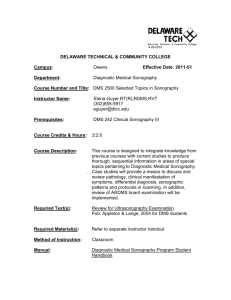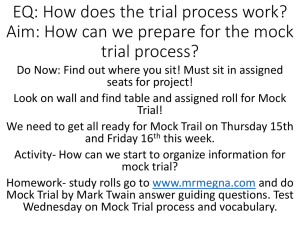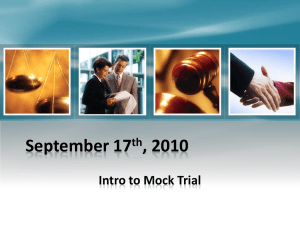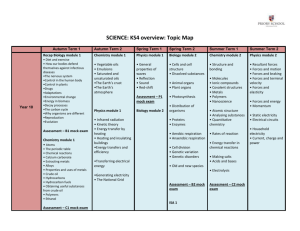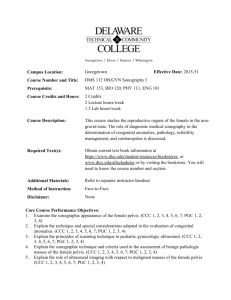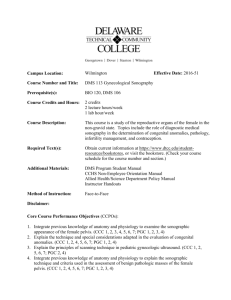DMS 250 201552 - E
advertisement
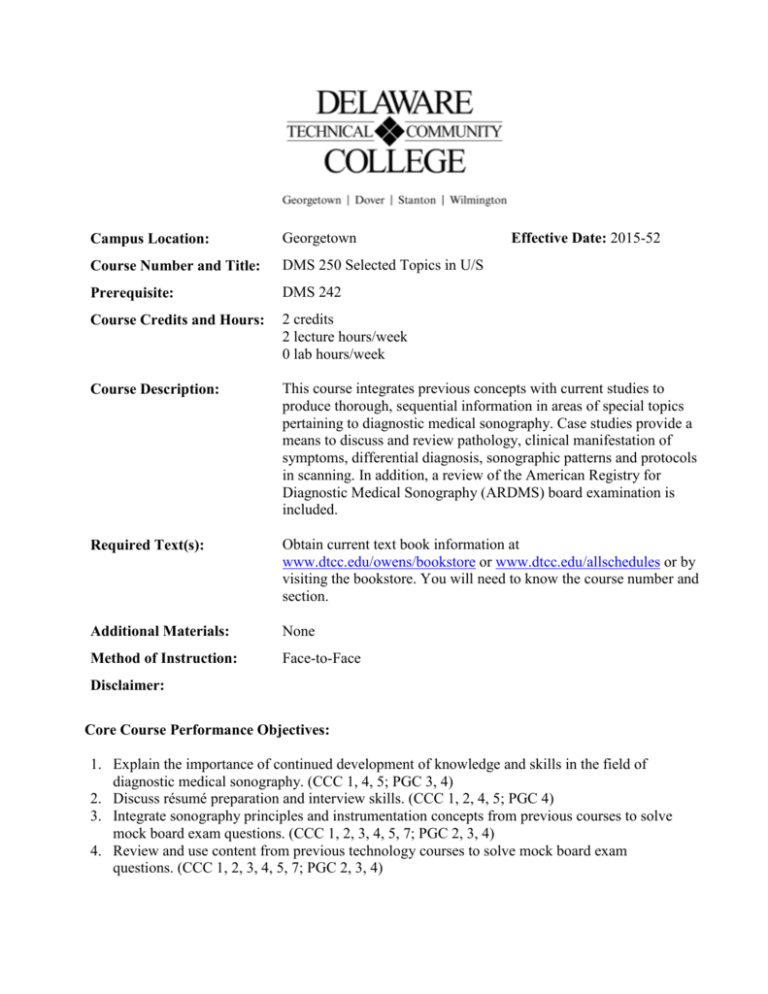
Campus Location: Georgetown Effective Date: 2015-52 Course Number and Title: DMS 250 Selected Topics in U/S Prerequisite: DMS 242 Course Credits and Hours: 2 credits 2 lecture hours/week 0 lab hours/week Course Description: This course integrates previous concepts with current studies to produce thorough, sequential information in areas of special topics pertaining to diagnostic medical sonography. Case studies provide a means to discuss and review pathology, clinical manifestation of symptoms, differential diagnosis, sonographic patterns and protocols in scanning. In addition, a review of the American Registry for Diagnostic Medical Sonography (ARDMS) board examination is included. Required Text(s): Obtain current text book information at www.dtcc.edu/owens/bookstore or www.dtcc.edu/allschedules or by visiting the bookstore. You will need to know the course number and section. Additional Materials: None Method of Instruction: Face-to-Face Disclaimer: Core Course Performance Objectives: 1. Explain the importance of continued development of knowledge and skills in the field of diagnostic medical sonography. (CCC 1, 4, 5; PGC 3, 4) 2. Discuss résumé preparation and interview skills. (CCC 1, 2, 4, 5; PGC 4) 3. Integrate sonography principles and instrumentation concepts from previous courses to solve mock board exam questions. (CCC 1, 2, 3, 4, 5, 7; PGC 2, 3, 4) 4. Review and use content from previous technology courses to solve mock board exam questions. (CCC 1, 2, 3, 4, 5, 7; PGC 2, 3, 4) 5. Prepare a case study independently using appropriate records, patient information, and didactic knowledge of clinical skills to accurately form a sonographer’s impression. (CCC 1, 2, 3, 4, 5, 6, 7; PGC 1, 2, 3, 4) 6. Describe the fundamental elements for implementing a quality assurance and improvement program and the policies, protocols, and procedures for the general function of the ultrasound laboratory. (CCC 1, 2, 3, 4, 5, 6, 7; PGC 1, 2, 3, 4) See Core Curriculum Competencies (CCC) and Program Graduate Competencies (PGC) at the end of the syllabus. Course objectives are coded to the competency(cies) they develop. Measurable Performance Objectives: Upon completion of this course, the student will: 1. Explain the importance of continued development of knowledge and skills in the field of diagnostic medical sonography. 1.1 Describe various professional societies and their services. 1.2 Explain the importance of continuing education within the profession. 1.3 Explain the process of ARDMS board exam and the importance of acquiring the registry in Registry for Diagnostic Medical Sonography (RDMS). 1.4 Explain the requirements for continuing competency through the continuing medical education (CME) credits. 2. Discuss résumé preparation and interview skills. 2.1 2.2 2.3 2.4 List the components and structure of a résumé. Discuss résumé writing and layout. Discuss interviewing skills. Discuss effective cover letter formats and content. 3. Integrate sonography principles and instrumentation concepts from previous courses to solve mock board exam questions. 3.1 Retrieve and explain proper patient care techniques to solve mock board exam questions for these topics: a. Patient identification/documentation b. Patient interaction c. Verification of requested examination d. Emergency situation e. Universal precaution f. Bioeffects and as low as (is) reasonably achievable (ALARA) 3.2 Integrate and describe physical principles of sound waves and the interaction with tissue to solve mock board exam questions. 3.3 Retrieve and explain the construction, characteristics, and types of transducers to solve mock board exam questions. 3.4 Differentiate spatial and temporal resolutions to solve mock board exam questions. 3.5 Integrate and describe pulse-echo instrumentation to solve mock board exam questions. 3.6 Integrate and explain Doppler effect, instrumentation, and hemodynamics to solve mock board exam questions. 3.7 Retrieve and describe quality assurance and quality control of equipment to solve mock board exam questions. 4. Review and use content from previous courses to solve mock board exam questions. 4.1 Retrieve and integrate basic anatomy and sonographic images of structures related to either abdominal, small parts, or obstetrics and gynecology (OB/GYN) specialties to solve mock board exam questions. 4.2 Integrate and explain normal physiology and pathophysiology of structures related to either abdominal, small parts, or OB/GYN specialties to solve mock board exam questions. 4.3 Integrate and explain patient history, physical exam, and sonographic procedures related to either abdominal, small parts, or OB/GYN specialties to solve mock board exam questions. 4.4 Integrate and explain treatment including prophylaxis, medical, surgical, and interventional procedures to solve mock board exam questions. 4.5 Retrieve and describe other non-invasive and invasive diagnostic procedures to solve mock board exam questions. 5. Prepare a case study independently using appropriate records, patient information, and didactic knowledge of clinical skills to accurately form a sonographer’s impression. 5.1 Describe a clinical case pertaining to technology by retrieving, organizing, analyzing, and interpreting data including patient’s age, gender, signs and symptoms, medical history, indication for ultrasound, type of ultrasound, procedures done, technologist’s impression (describe sonographic appearance and explain specific sonographic or other features leading to diagnosis), differential diagnosis, physician’s report, follow-up treatment, and prognosis. 5.2 Discuss disease processes and complications, including origin, signs and symptoms, risk factors, ultrasound involvement, and treatment using the specific case and references. 5.3 Compose well-structured written technical reports. 5.4 Present a case study orally in a professional manner. 6. Describe the fundamental elements for implementing a quality assurance and improvement program and the policies, protocols, and procedures for the general function of the ultrasound laboratory. 6.1 Describe the elements in a quality assurance and improvement program. 6.2 Discuss typical policies, protocols, and procedures for the general function of an ultrasound laboratory. 6.3 Discuss current trends in healthcare systems. Evaluation Criteria/Policies: Students will demonstrate proficiency on all Core Course Performance Objectives at least to the 75 percent level to successfully complete the course. The grade will be determined using the College Grading System: 92 – 100= 83 – 91 = 75 – 82 = 0 – 74 = A B C F Students should refer to the Student Handbook for information on Academic Standing Policy, Academic Honesty Policy, Student Rights and Responsibilities, and other policies relevant to their academic progress. Core Curriculum Competencies: (The competencies every graduate will develop) 1. 2. 3. 4. 5. Communicate clearly and effectively both orally and in writing. Demonstrate effective problem solving and reasoning skills. Work effectively in groups of people from diverse backgrounds. Demonstrate ethical and professional understanding and conduct. Apply appropriate information literacy skills to locate, evaluate, and use information effectively. 6. Use computer technology appropriate to the field. 7. Use scientific and mathematical reasoning appropriate to the technology. Program Graduate Competencies: (The competencies every graduate will develop specific to his/her major.) 1. Graduates will demonstrate clinical competence by performing a full range of diagnostic medical sonography procedures on all patient populations pertaining to their learning concentration. 2. Graduates will professionally utilize verbal, nonverbal, and written communication skills in patient care, procedure intervention, and professional relationships. 3. Graduates will demonstrate professional growth and development by acting in a professional and ethical manner and comply with the professional scope of practice. 4. Graduates will integrate critical thinking and problem solving skills as expected of a healthcare professional.
